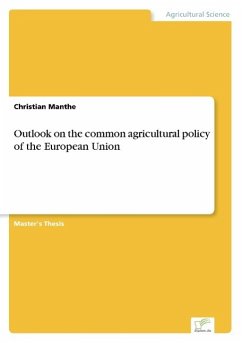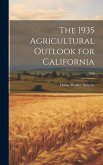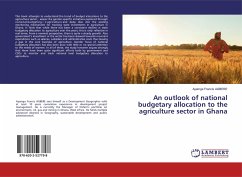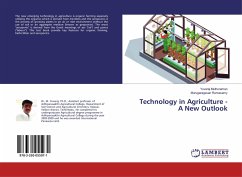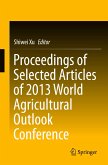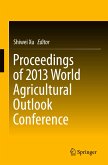Master's Thesis from the year 2003 in the subject Agrarian Studies, grade: 1,0, Corvinus University Budapest (International Business and Economics), language: English, abstract: Inhaltsangabe:Introduction:
The focus of the thesis is the Direct Payments Systems of the Common Agricultural Policy of the European Union as introduced as part of the MacSharry reform and extended under the Agenda 2000. The objective is to analyse the current system and the proposals made by the Commission in January 2003 regarding a decoupling of these payments. The Common Agricultural Policy was one of the first policies developed in the European Union, and one of those regulated in the greatest detail. Among the European Union's policies, the CAP is regarded as one of the most important policy areas. This is justified not only because of its share of the EU budget, the vast number of people and the extent of the territory directly affected, but also because of its symbolic significance and the extent of sovereignty transferred from the national to the European level. The significance of the CAP, nowadays, is also portrayed by the fact that it is directly related to the Single Market and the EMU, two key areas in achieving the European integration. The objective of the CAP was to support the agricultural sector in the Member States.
The second chapter of this thesis will provide general legal background information on the institutions of the EU and the functioning of the decision-making processes with regards to the agricultural sector. The history of the CAP, it s functioning, the reasons for its creation and some general information will be outlined in chapter 3. Special emphasis will be on the common market organisations, the second pillar of the CAP, the rural development policy and the system of Direct Payments. The history will also cover the Agenda 2000, the Mid-term review and especially the latest reform proposals of the EU in January 2003. The proposals with regard to the Direct Payments, such as the decoupling and the modulation, will be subject to a closer analysis in chapter 7. The chapter 4 covers the EU enlargement and gives an overview of the new challenges arising by that for the EU. Even though the consequences of the enlargement are significant in some areas of the CAP, this thesis will not provide a closer analysis of all the dimensions. The topic of the EU enlargement itself is too extensive to be covered by a single chapter. The focus of this thesis is on the Direct Payment system of the CAP and thus the consequences of EU enlargement will only be portrayed on this background. Chapter 6 provides a short evaluation of the overall gains and losses of the CAP for the EU, citizens and with regards to the WTO and the US. The US system itself will be portrayed shortly in the following chapter. Thereby the different approach and attitude of the USA will be explained.
The following chapter will then, on the background of the information provided before, discuss the Direct Payment system of the CAP with regards to the proposals of the European Commission. The chapter also introduces the Bond scheme, which provides an overview about how a decoupling could possibly take place.
The findings will be shortly summarized in the last chapter.
Inhaltsverzeichnis:Table of Contents:
Table of ContentsI
Tables & GraphsII
AbbreviationsIII
1.Introduction1
2.Legal Background3
2.1Institutions of the EC3
2.1.1Commission3
2.1.2The Council of the European Union4
2.2General Principles of law6
2.2.1Equality7
2.2.2Subsidiarity7
3.The Common Agricultural Policy8
3.1Reasons for development8
3.2History of the CAP9
3.3Functioning18
3.3.1Common market organisations19
3.3.2Direct Payments21
3.3.3Support for Rural Development25
3.4EAGGF27
3.5Facts in Figures28
4.Eastern e...
The focus of the thesis is the Direct Payments Systems of the Common Agricultural Policy of the European Union as introduced as part of the MacSharry reform and extended under the Agenda 2000. The objective is to analyse the current system and the proposals made by the Commission in January 2003 regarding a decoupling of these payments. The Common Agricultural Policy was one of the first policies developed in the European Union, and one of those regulated in the greatest detail. Among the European Union's policies, the CAP is regarded as one of the most important policy areas. This is justified not only because of its share of the EU budget, the vast number of people and the extent of the territory directly affected, but also because of its symbolic significance and the extent of sovereignty transferred from the national to the European level. The significance of the CAP, nowadays, is also portrayed by the fact that it is directly related to the Single Market and the EMU, two key areas in achieving the European integration. The objective of the CAP was to support the agricultural sector in the Member States.
The second chapter of this thesis will provide general legal background information on the institutions of the EU and the functioning of the decision-making processes with regards to the agricultural sector. The history of the CAP, it s functioning, the reasons for its creation and some general information will be outlined in chapter 3. Special emphasis will be on the common market organisations, the second pillar of the CAP, the rural development policy and the system of Direct Payments. The history will also cover the Agenda 2000, the Mid-term review and especially the latest reform proposals of the EU in January 2003. The proposals with regard to the Direct Payments, such as the decoupling and the modulation, will be subject to a closer analysis in chapter 7. The chapter 4 covers the EU enlargement and gives an overview of the new challenges arising by that for the EU. Even though the consequences of the enlargement are significant in some areas of the CAP, this thesis will not provide a closer analysis of all the dimensions. The topic of the EU enlargement itself is too extensive to be covered by a single chapter. The focus of this thesis is on the Direct Payment system of the CAP and thus the consequences of EU enlargement will only be portrayed on this background. Chapter 6 provides a short evaluation of the overall gains and losses of the CAP for the EU, citizens and with regards to the WTO and the US. The US system itself will be portrayed shortly in the following chapter. Thereby the different approach and attitude of the USA will be explained.
The following chapter will then, on the background of the information provided before, discuss the Direct Payment system of the CAP with regards to the proposals of the European Commission. The chapter also introduces the Bond scheme, which provides an overview about how a decoupling could possibly take place.
The findings will be shortly summarized in the last chapter.
Inhaltsverzeichnis:Table of Contents:
Table of ContentsI
Tables & GraphsII
AbbreviationsIII
1.Introduction1
2.Legal Background3
2.1Institutions of the EC3
2.1.1Commission3
2.1.2The Council of the European Union4
2.2General Principles of law6
2.2.1Equality7
2.2.2Subsidiarity7
3.The Common Agricultural Policy8
3.1Reasons for development8
3.2History of the CAP9
3.3Functioning18
3.3.1Common market organisations19
3.3.2Direct Payments21
3.3.3Support for Rural Development25
3.4EAGGF27
3.5Facts in Figures28
4.Eastern e...

